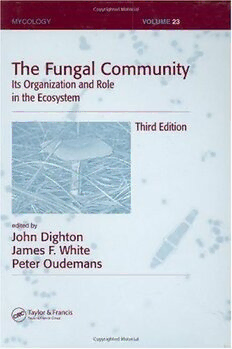Download The Fungal Community: Its Organization and Role in the Ecosystem (Mycology) PDF Free - Full Version
Download The Fungal Community: Its Organization and Role in the Ecosystem (Mycology) by John Dighton, James F. White Jr., Peter Oudemans in PDF format completely FREE. No registration required, no payment needed. Get instant access to this valuable resource on PDFdrive.to!
About The Fungal Community: Its Organization and Role in the Ecosystem (Mycology)
The Fungal Community: Its Organization and Role in the Ecosystem, Third Edition addresses many of the questions related to the observations, characterizations, and functional attributes of fungal assemblages and their interaction with the environment and other organisms. This edition promotes awareness of the functional methods of classification over taxonomic methods, and approaches the concept of fungal communities from an ecological perspective, rather than from a fungicentric view. It has expanded to examine issues of global and local biodiversity, the problems associated with exotic species, and the debate concerning diversity and function. The third edition also focuses on current ecological discussions - diversity and function, scaling issues, disturbance, and invasive species - from a fungal perspective. In order to address these concepts, the book examines the appropriate techniques to identify fungi, calculate their abundance, determine their associations among themselves and other organisms, and measure their individual and community function. This book explains attempts to scale these measures from the microscopic cell level through local, landscape, and ecosystem levels. The totality of the ideas, methods, and results presented by the contributing authors points to the future direction of mycology.
Detailed Information
| Author: | John Dighton, James F. White Jr., Peter Oudemans |
|---|---|
| Publication Year: | 2005 |
| ISBN: | 9780824723552 |
| Pages: | 966 |
| Language: | English |
| File Size: | 14.321 |
| Format: | |
| Price: | FREE |
Safe & Secure Download - No registration required
Why Choose PDFdrive for Your Free The Fungal Community: Its Organization and Role in the Ecosystem (Mycology) Download?
- 100% Free: No hidden fees or subscriptions required for one book every day.
- No Registration: Immediate access is available without creating accounts for one book every day.
- Safe and Secure: Clean downloads without malware or viruses
- Multiple Formats: PDF, MOBI, Mpub,... optimized for all devices
- Educational Resource: Supporting knowledge sharing and learning
Frequently Asked Questions
Is it really free to download The Fungal Community: Its Organization and Role in the Ecosystem (Mycology) PDF?
Yes, on https://PDFdrive.to you can download The Fungal Community: Its Organization and Role in the Ecosystem (Mycology) by John Dighton, James F. White Jr., Peter Oudemans completely free. We don't require any payment, subscription, or registration to access this PDF file. For 3 books every day.
How can I read The Fungal Community: Its Organization and Role in the Ecosystem (Mycology) on my mobile device?
After downloading The Fungal Community: Its Organization and Role in the Ecosystem (Mycology) PDF, you can open it with any PDF reader app on your phone or tablet. We recommend using Adobe Acrobat Reader, Apple Books, or Google Play Books for the best reading experience.
Is this the full version of The Fungal Community: Its Organization and Role in the Ecosystem (Mycology)?
Yes, this is the complete PDF version of The Fungal Community: Its Organization and Role in the Ecosystem (Mycology) by John Dighton, James F. White Jr., Peter Oudemans. You will be able to read the entire content as in the printed version without missing any pages.
Is it legal to download The Fungal Community: Its Organization and Role in the Ecosystem (Mycology) PDF for free?
https://PDFdrive.to provides links to free educational resources available online. We do not store any files on our servers. Please be aware of copyright laws in your country before downloading.
The materials shared are intended for research, educational, and personal use in accordance with fair use principles.

